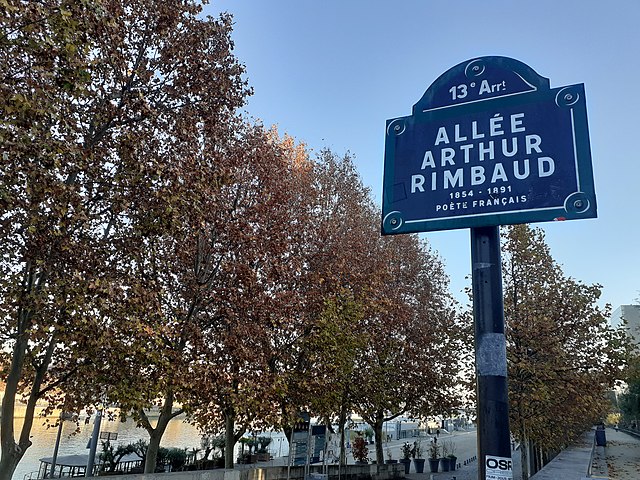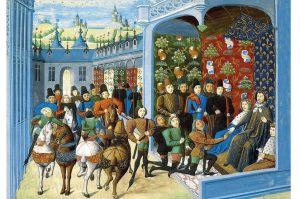The life of poète maudit and gunrunner Arthur Rimbaud is a puzzle to nearly everyone who knows it. A precocious student who won a regional concours académique for a poem in Latin, Rimbaud left school at fifteen, shortly after the start of the Franco-German War. After two attempts to escape home for Paris, he finally moved in with the poet Paul Verlaine in the fall of 1871, where he succeeded in insulting all the literary lights of Paris in three months.
The two men began an affair, which ruined what was left of Verlaine’s marriage to Mathilde Mauté (whom Verlaine regularly beat). They made two debauched trips to London and eventually fell out in Belgium, where Verlaine shot Rimbaud in the wrist.
Rimbaud returned home and published A Season in Hell in 1873, a collection of prose poems that Rimbaud calls his “carnet de damné” — “notebook of the damned” — in which the speaker longs for some sort of redemption but declares that “The Gospel has passed!” and so “The best is a good drunken sleep on the beach.”
The book was an utter failure. From 1874 to 1875, Rimbaud would travel around Europe — first to England again, then Stuttgart, Milan, Marseille and Paris before enlisting in the Dutch army in 1876, from which he deserted shortly afterwards. In 1878, he began work as a construction foreman in Cyprus but moved to Ethiopia in 1880 after he killed a worker. There, he became a coffee trader and gunrunner. He would only return to his native France in 1891 to die.
Critics have tended to speak of two Rimbauds — the drunken teenage poet and the African trader — as if they were two different people. Dominique Noguez skewers this analysis in Les Trois Rimbauds (originally published in 1986 but only now translated into English) by imagining a third — a Rimbaud who not only lived past the age of thirty-nine but returned to Paris to great literary acclaim. Noguez’s Rimbaud also marries the daughter of the ardent Catholic poet Paul Claudel, converts to Catholicism himself, and publishes verse in a more traditional style that makes his earlier poetry seem like an aberration.
Three Rimbauds opens with an imaginary speech by Paul Valéry welcoming Rimbaud to the Académie française and praising his African Nights (a work Noguez imagines Rimbaud wrote during his time in Africa): “I haven’t forgotten, dear Sir, that you didn’t take your first steps among us with this large tome: it was preceded by a number of small chapbooks, which ought to be republished, someday.”
It’s a nice touch imagining A Season in Hell and Illuminations, which have been and remain popular with professors in the thrall of theory, as out-of-print juvenilia: “In them, you show that you are, in verse as in prose, one of our first Symbolists: a little less well known than the others but a little more precocious; a little more tormented and a little more visionary . . . before living your thousand and one nights in Africa, you had the luxury of a brief ‘Night of Hell’.” Three Rimbauds is full of such pitch-perfect touches.
But Noguez is also making a serious point. He has written elsewhere, which Seth Whidden cites in his translator’s introduction (the translation is excellent), that “Showing what a writer could plausibly have become and what he could have written is also making a statement about who he was, and about the meaning of what he wrote.”
If that’s the case, Noguez sees the young Rimbaud as a man on a serious spiritual quest in A Season in Hell, but who also took literary conventions seriously, even when he was breaking them in the name of originality, which is also a convention. While Rimbaud’s antics in Paris that so appalled the literary elite of his day may seem to be the actions of a man who puts no stock in the opinion of others, one could also read them as a perverse if miscalculated attempt to impress.
From what we know, Rimbaud died an atheist or agnostic, but it is not implausible to imagine Rimbaud turning to religion. The Italian journalist Ugo Ferrandi met Rimbaud in 1886 and wrote that he had become an “Arabist” who taught the Qur’an to locals.
Whatever Noguez’s Three Rimbauds tells us about the actual Rimbaud, it is a fun little read. But like Kevnt Johnson’s more recent A Question Mark Above the Sun (in which he suggests that the poet Frank O’Hara did not write one of the poems attributed to him), Three Rimbauds will mostly appeal to aficionados. The more one knows about Rimbaud and literary criticism generally, the more one will likely enjoy the book’s subtler jibes.


















